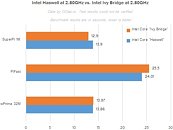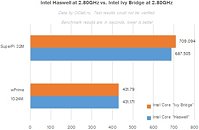Friday, February 1st 2013

Intel "Haswell" Quad-Core CPU Benchmarked, Compared Clock-for-Clock with "Ivy Bridge"
Russian tech publication OCLab.ru, which claims access to Intel's next-generation Core "Haswell" processor engineering-sample (and an LGA1150 8-series motherboard!), wasted no time in running a quick clock-for-clock performance comparison with the current Core "Ivy Bridge" processor. In its comparison, it set both chips to run at a fixed 2.80 GHz clock speed (by disabling Turbo Boost, C1E, and EIST), indicating that the ES OCLab is in possession of doesn't go beyond that frequency.
The two chips were put through SuperPi 1M, PiFast, and wPrime 32M. The Core "Haswell" chip is only marginally faster than Ivy Bridge, in fact slower in one test. In its next battery of tests, the reviewer stepped up iterations (load), putting the chips through single-threaded SuperPi 32M, and multi-threaded wPrime 1024M. While wPrime performance is nearly identical between the two chips, Haswell crunched SuperPi 32M about 3 percent quicker than Ivy Bridge. It's still to early to take a call on CPU performance percentage difference between the two architectures. Intel's Core "Haswell" processors launch in the first week of June.
Source:
OCLab.ru
The two chips were put through SuperPi 1M, PiFast, and wPrime 32M. The Core "Haswell" chip is only marginally faster than Ivy Bridge, in fact slower in one test. In its next battery of tests, the reviewer stepped up iterations (load), putting the chips through single-threaded SuperPi 32M, and multi-threaded wPrime 1024M. While wPrime performance is nearly identical between the two chips, Haswell crunched SuperPi 32M about 3 percent quicker than Ivy Bridge. It's still to early to take a call on CPU performance percentage difference between the two architectures. Intel's Core "Haswell" processors launch in the first week of June.


118 Comments on Intel "Haswell" Quad-Core CPU Benchmarked, Compared Clock-for-Clock with "Ivy Bridge"
1. A CPU can be as fast as another C2C but the other comes naturally clocked higher
2. A CPU can be overclocked much further than another
So, of course a bugatti veiron at 60km/h would be as fast as fiat uno at 60km/h
For those who want examples, benchmark an i7 920 against 3770K C2C and see what im talking about.
I understand where you are coming from with regards overclocking headroom but that normally forms part of a FULL review also.
Needless to say, my FX 4100@3.6 is miles behind a 2600K@3.6 :D
A good example was when BD launched and was compared to the older gen per clock and you could see that the IPC decreased.
I agree that at the end it doesn't matter much since you can "hide" that with clock speed, but for architecture comparison it's the only way.
In the case of various phenom II revisions they could all pretty much be clocked to the same area of 3.8/4Ghz but effectively(as they were the same architecture) gave the same performance at the same clocks.
C2C is best used when it's between two different architecures.
There's still plenty of room for haswell to be an impressive option compared to ivy bridge - clock speed, power consumption, graphics performance, etc - but we at least now know that in some kinds of tasks, performance is basically identical. I think their architecture improvements will make some benchmarks show a much larger difference, but apparently calculating pi or prime numbers hasn't gotten a performance boost since ivy bridge.
I'm not sure however what is up with the wprime results, as that program should be able to use newer instruction sets? According to www.realworldtech.com/haswell-cpu/, Haswells IPC should be substantially higher than ivy bridge. I guess we can only wait and see, but I dont believe these results are 100% accurate.
All of these benchmarks are greatly effected by memory bandwidth as well. I am looking forward to seeing how well Haswell Integrated Memory Controller has improved for over clocking memory. These scores with the CPU at same speeds and max memory overclock on each cpu will show just how much stronger Haswell is over all.
Nice to see AMD providing stiff competition to Intel. :rolleyes:
We'll only gain if it clocks higher and has a proper soldered heatspreader and that remains to be seen.